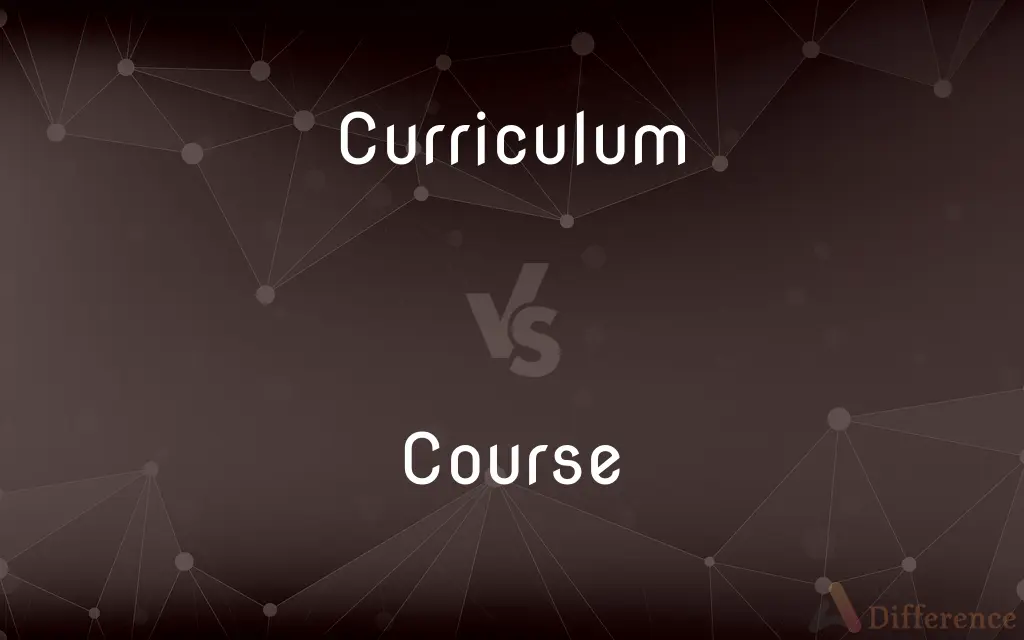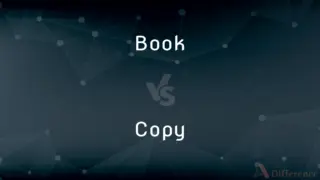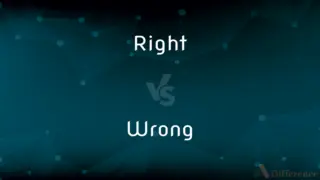Curriculum vs. Course — What's the Difference?
By Tayyaba Rehman & Urooj Arif — Updated on March 24, 2024
Curriculum is a comprehensive plan for an educational or training program, while a course is a single unit of teaching within a curriculum.

Difference Between Curriculum and Course
Table of Contents
ADVERTISEMENT
Key Differences
A curriculum encompasses the entire educational content and experiences provided by an educational institution or program, including the objectives, content, methods, resources, and assessment strategies. It is designed to guide the overall educational process over a certain period, often including multiple courses. On the other hand, a course refers to a specific subject of study offered over a defined period, typically a semester or year, focusing on a particular topic or field within the broader curriculum.
While a curriculum outlines the educational goals, standards, and learning outcomes expected for a program or institution, a course is concerned with the delivery of content and experiences related to a specific topic. A curriculum provides a framework for the educational journey, detailing the pathway through which learners can achieve the intended outcomes, whereas a course represents a single step or component within this larger journey.
Curriculums are designed with a holistic view, considering the progression of learning across various courses and subjects to ensure a coherent and comprehensive education. Courses, however, are designed to delve deeply into a particular subject area, providing detailed knowledge and understanding that contribute to the overarching goals of the curriculum.
In the development of educational programs, the curriculum serves as the blueprint, outlining the scope and sequence of learning that includes various courses. Each course within the curriculum is then tailored to meet specific parts of this blueprint, focusing on particular skills, knowledge areas, and competencies that contribute to the overall educational objectives.
Understanding the distinction between curriculum and course is crucial for educators, students, and administrators. It helps in planning educational experiences, setting academic goals, and assessing educational outcomes. While the curriculum sets the stage for a comprehensive educational experience, courses provide the content and context for individual learning experiences within that framework.
ADVERTISEMENT
Comparison Chart
Definition
A comprehensive plan for an educational or training program.
A single unit of teaching within a curriculum, on a specific subject.
Scope
Broad, covering the entire educational content and experiences.
Narrow, focused on a specific topic or field.
Duration
Extends over the entire length of an educational program.
Offered over a defined period, like a semester or year.
Purpose
To outline the educational goals, standards, and learning outcomes.
To deliver content and experiences related to a specific topic.
Focus
On the overall educational journey and progression.
On detailed knowledge and understanding of a particular area.
Compare with Definitions
Curriculum
Designed to provide a coherent and comprehensive educational experience across various subjects.
The high school curriculum includes a mix of core subjects and electives to cater to diverse interests.
Course
Offered for a defined period, often a semester or academic year, with specific learning objectives.
The introductory psychology course runs for one semester and covers the basics of human behavior.
Curriculum
A structured framework that guides the educational journey, detailing courses and content.
The university's curriculum is designed to ensure students receive a well-rounded education in their field.
Course
May be mandatory or elective, depending on the curriculum and the student's educational goals.
Elective courses allow students to explore interests beyond their major requirements.
Curriculum
Includes the goals, learning outcomes, content, teaching methodologies, and assessment strategies for an educational program.
The curriculum committee meets regularly to review learning outcomes and assessment strategies.
Course
Involves lectures, readings, discussions, and assessments related to the topic.
The course includes weekly lectures, group discussions, and a final project.
Curriculum
Serves as the blueprint for educational institutions in planning and delivering educational programs.
Accreditation bodies evaluate schools based on how well their curriculums meet established educational standards.
Course
A specific subject of study within a curriculum, focusing on a particular topic or field.
She enrolled in a course on Environmental Science as part of her biology degree.
Curriculum
Focuses on the progression of learning, ensuring students build upon their knowledge systematically.
The curriculum for the nursing program is structured to advance from basic to complex concepts over four years.
Course
Designed to provide in-depth knowledge and understanding of a particular area, contributing to the curriculum's goals.
The course on Shakespearean drama aims to deepen students' appreciation of English literature.
Curriculum
In education, a curriculum (; plural curricula or curriculums) is broadly defined as the totality of student experiences that occur in the educational process. The term often refers specifically to a planned sequence of instruction, or to a view of the student's experiences in terms of the educator's or school's instructional goals.
Course
Development in a particular way; progress
The course of events.
Curriculum
All the courses of study offered by an educational institution.
Course
Movement in time; duration
In the course of a year.
Curriculum
A group of related courses, often in a special field of study
The engineering curriculum.
Course
The direction of continuing movement
The boat took a northern course.
Curriculum
The set of courses, coursework, and their content, offered at a school or university.
Course
The route or path taken by something that moves, such as a stream or vehicle.
Curriculum
(obsolete) A racecourse; a place for running.
Course
A designated route or area on which a race is held
The course of a marathon.
Curriculum
A race course; a place for running.
Course
See golf course.
Curriculum
A course; particularly, a specified fixed course of study, as in a university.
Course
A mode of action or behavior
Followed the best course and invested her money.
Curriculum
An integrated course of academic studies;
He was admitted to a new program at the university
Course
A typical, natural, or customary manner of proceeding or developing
A fad that ran its course.
Course
A systematic or orderly succession; a sequence
A course of medical treatments.
Course
A continuous layer of building material, such as brick or tile, on a wall or roof of a building.
Course
A complete body of prescribed studies constituting a curriculum
A four-year course in engineering.
Course
A unit of such a curriculum
Took an introductory course in chemistry.
Passed her calculus course.
Course
A part of a meal served as a unit at one time
The first course was a delicious soup.
Course
(Nautical) The lowest sail on a mast of a square-rigged ship.
Course
A point on the compass, especially the one toward which a vehicle, such as a ship, is moving.
Course
(Music) A string or set of two or more closely-spaced and usually identically-tuned strings, as on a lute.
Course
To move swiftly through or over; traverse
Ships coursing the seas.
Course
To hunt (game) with hounds.
Course
To set (hounds) to chase game.
Course
To proceed or move swiftly in a certain direction or along a course
"Big tears now coursed down her face" (Iris Murdoch).
Course
To hunt game with hounds.
Course
A sequence of events.
The normal course of events seems to be just one damned thing after another.
Course
A normal or customary sequence.
Course
A programme, a chosen manner of proceeding.
Course
Any ordered process or sequence of steps.
Course
A learning programme, whether a single class or (UK) a major area of study.
I need to take a French course.
Course
A treatment plan.
Course
A stage of a meal.
We offer seafood as the first course.
Course
The succession of one to another in office or duty; order; turn.
Course
A path that something or someone moves along.
His illness ran its course.
Course
The itinerary of a race.
The cross-country course passes the canal.
Course
A racecourse.
Course
The path taken by a flow of water; a watercourse.
Course
(sports) The trajectory of a ball, frisbee etc.
Course
(golf) A golf course.
Course
(nautical) The direction of movement of a vessel at any given moment.
The ship changed its course 15 degrees towards south.
Course
(navigation) The intended passage of voyage, such as a boat, ship, airplane, spaceship, etc.
A course was plotted to traverse the ocean.
Course
The drive usually frequented by Europeans at an Indian station.
Course
(nautical) The lowest square sail in a fully rigged mast, often named according to the mast.
Main course and mainsail are the same thing in a sailing ship.
Course
Menses.
Course
A row or file of objects.
Course
(masonry) A row of bricks or blocks.
On a building that size, two crews could only lay two courses in a day.
Course
(roofing) A row of material that forms the roofing, waterproofing or flashing system.
Course
(textiles) In weft knitting, a single row of loops connecting the loops of the preceding and following rows.
Course
(music) One or more strings on some musical instruments (such as the guitar, lute or vihuela): if multiple, then closely spaced, tuned in unison or octaves and intended to played together.
Course
(transitive) To run through or over.
Course
(transitive) To pursue by tracking or estimating the course taken by one's prey; to follow or chase after.
Course
(transitive) To cause to chase after or pursue game.
To course greyhounds after deer
Course
The act of moving from one point to another; progress; passage.
And when we had finished our course from Tyre, we came to Ptolemais.
Course
The ground or path traversed; track; way.
The same horse also run the round course at Newmarket.
Course
Motion, considered as to its general or resultant direction or to its goal; line progress or advance.
A light by which the Argive squadron steersTheir silent course to Ilium's well known shore.
Westward the course of empire takes its way.
Course
Progress from point to point without change of direction; any part of a progress from one place to another, which is in a straight line, or on one direction; as, a ship in a long voyage makes many courses; a course measured by a surveyor between two stations; also, a progress without interruption or rest; a heat; as, one course of a race.
Course
Motion considered with reference to manner; or derly progress; procedure in a certain line of thought or action; as, the course of an argument.
The course of true love never did run smooth.
Course
Customary or established sequence of events; recurrence of events according to natural laws.
By course of nature and of law.
Day and night,Seedtime and harvest, heat and hoary frost,Shall hold their course.
Course
Method of procedure; manner or way of conducting; conduct; behavior.
My lord of York commends the plot and the general course of the action.
By perseverance in the course prescribed.
You hold your course without remorse.
Course
A series of motions or acts arranged in order; a succession of acts or practices connectedly followed; as, a course of medicine; a course of lectures on chemistry.
Course
The succession of one to another in office or duty; order; turn.
He appointed . . . the courses of the priests
Course
That part of a meal served at one time, with its accompaniments.
He [Goldsmith] wore fine clothes, gave dinners of several courses, paid court to venal beauties.
Course
A continuous level range of brick or stones of the same height throughout the face or faces of a building.
Course
The lowest sail on any mast of a square-rigged vessel; as, the fore course, main course, etc.
Course
The menses.
Course
To run, hunt, or chase after; to follow hard upon; to pursue.
We coursed him at the heels.
Course
To cause to chase after or pursue game; as, to course greyhounds after deer.
Course
To run through or over.
The bounding steed courses the dusty plain.
Course
To run as in a race, or in hunting; to pursue the sport of coursing; as, the sportsmen coursed over the flats of Lancashire.
Course
Education imparted in a series of lessons or class meetings;
He took a course in basket weaving
Flirting is not unknown in college classes
Course
A connected series of events or actions or developments;
The government took a firm course
Historians can only point out those lines for which evidence is available
Course
Facility consisting of a circumscribed area of land or water laid out for a sport;
The course had only nine holes
The course was less than a mile
Course
A mode of action;
If you persist in that course you will surely fail
Once a nation is embarked on a course of action it becomes extremely difficult for any retraction to take place
Course
A line or route along which something travels or moves;
The hurricane demolished houses in its path
The track of an animal
The course of the river
Course
General line of orientation;
The river takes a southern course
The northeastern trend of the coast
Course
Part of a meal served at one time;
She prepared a three course meal
Course
(construction) a layer of masonry;
A course of bricks
Course
Move swiftly through or over;
Ships coursing the Atlantic
Course
Move along, of liquids;
Water flowed into the cave
The Missouri feeds into the Mississippi
Course
Hunt with hounds;
He often courses hares
Course
As might be expected;
Naturally, the lawyer sent us a huge bill
Common Curiosities
Can a curriculum change while a course remains the same?
Yes, curriculums may evolve to reflect new educational standards or societal needs, while a specific course might remain relatively unchanged if its content continues to meet those standards.
How do students interact with the curriculum and courses?
Students engage with the curriculum through the courses they take, which together provide the knowledge and skills outlined in the curriculum's goals.
How are courses assessed within a curriculum?
Courses are assessed based on their alignment with the curriculum's learning outcomes and the effectiveness in delivering the intended knowledge and skills.
What is an elective course?
An elective course is chosen by the student from options outside their major requirements, allowing exploration of other interests within the curriculum.
What is the main difference between a curriculum and a course?
The main difference is scope: a curriculum is the entire educational program, while a course is a single, specific subject within that program.
Can a course exist without a curriculum?
While a course can be designed independently, in educational institutions, it typically exists as part of a broader curriculum to ensure a cohesive learning experience.
How does a curriculum impact student learning?
A well-designed curriculum ensures a coherent progression of learning, meeting educational standards and preparing students for their future careers or studies.
Why might an educator need to understand both curriculums and courses?
Understanding both helps educators design effective courses that align with the overall educational goals and meet the needs of students within the curriculum.
Can online education have a curriculum?
Yes, online education programs also have curriculums, designed to provide a comprehensive educational experience through digital platforms.
What role do curriculums play in educational accreditation?
Curriculums are central to accreditation, as they demonstrate an institution's commitment to meeting educational standards and outcomes.
Share Your Discovery

Previous Comparison
Book vs. Copy
Next Comparison
Right vs. WrongAuthor Spotlight
Written by
Tayyaba RehmanTayyaba Rehman is a distinguished writer, currently serving as a primary contributor to askdifference.com. As a researcher in semantics and etymology, Tayyaba's passion for the complexity of languages and their distinctions has found a perfect home on the platform. Tayyaba delves into the intricacies of language, distinguishing between commonly confused words and phrases, thereby providing clarity for readers worldwide.
Co-written by
Urooj ArifUrooj is a skilled content writer at Ask Difference, known for her exceptional ability to simplify complex topics into engaging and informative content. With a passion for research and a flair for clear, concise writing, she consistently delivers articles that resonate with our diverse audience.














































